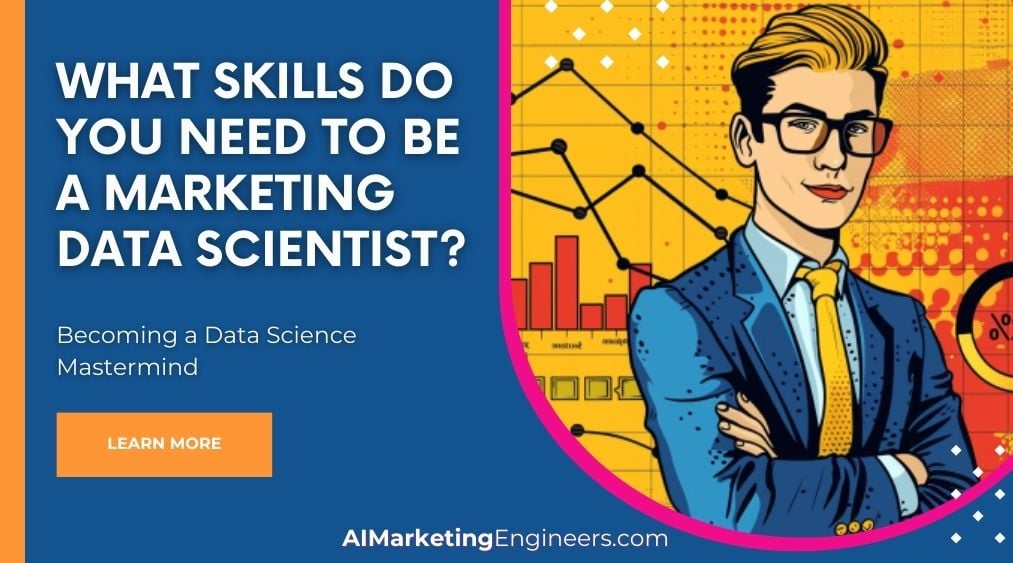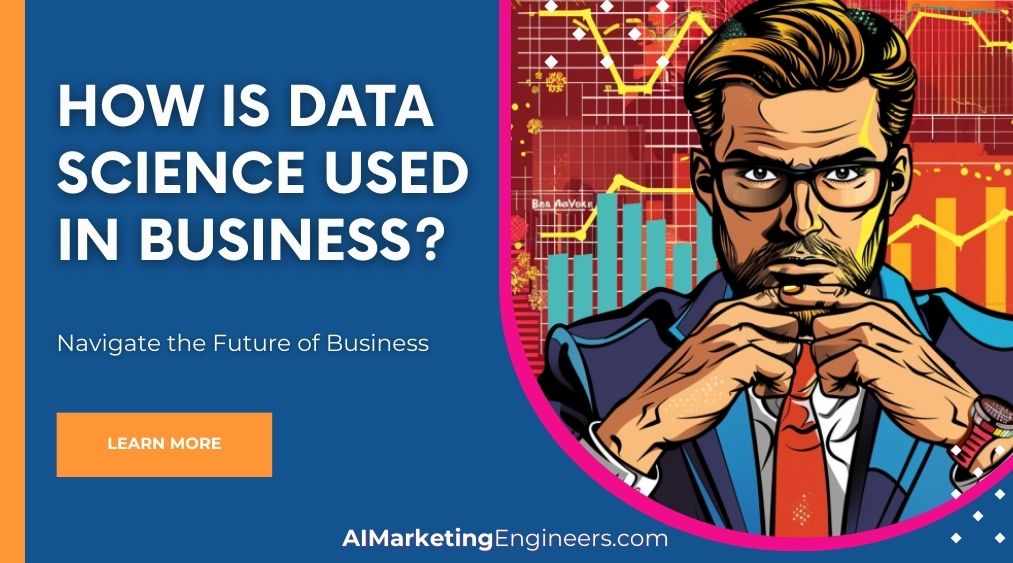Key Takeaways
✅ Statistical Analysis and Machine Learning: A firm grasp on statistical analysis and machine learning is non-negotiable for marketing data scientists. A McKinsey report suggests that businesses heavily reliant on data-analysis reporting are 23% more likely to outperform competitors in acquisition of new customers. Implement regular training and perhaps consider partnerships with data science institutes.
✅ Programming Skills: The efficiency of your data analytics relies heavily on your team’s programming proficiency. Statistics show that Python and R are the gold standards in data science. By facilitating access to high-quality learning resources, you enable your team to streamline data processing and refine modeling techniques.
✅ Communication and Storytelling: Impactful communication and storytelling are instrumental. Data visualization tools such as Tableau have seen a surge in demand, forecasting an 11% increase in job opportunities by 2024. Invest in storytelling workshops and promote an environment of consistent practice to translate data insights into business growth.

Introduction
Are you equipped with the skills to navigate the intricate world of marketing data science? In an era powered by data, standing out as a premier marketing data scientist requires more than number crunching—it demands a deep dive into cutting-edge tools and transformative approaches. This article demystifies the vast skill set needed, including technical prowess and strategic communication, forming the backbone of any data-driven success story.
By exploring advanced statistical methodologies, mastering sought-after programming languages, and honing persuasive storytelling capabilities, you'll be unlocking a treasure trove of opportunities to maximize revenue and elevate Return on Ad Spend (ROAS). Stay tuned for illuminating perspectives and modern strategies that can revolutionize your approach to data, as we deliver actionable insights and ground-breaking information, ready to be leveraged for transformative results.
Top Statistics
| Statistic | Insight |
|---|---|
| Data Analysis & Statistical Modeling: Among the top 10 in-demand hard skills globally according to LinkedIn's 2021 report. | In the e-commerce realm, being adept in data analysis and statistical modeling paves the way for robust predictive analytics, optimizing customer experiences and inventory management. |
| Python - The Programming Staple: The most commonly mentioned skill in data science role postings, per Glassdoor's 2020 study. | The versatility of Python empowers marketing data scientists to efficiently process large datasets and apply statistical techniques, fundamental in delivering personalized e-commerce strategies. |
| Machine Learning Expertise: Demand expected to increase by 97% by 2025, according to the World Economic Forum. | Harnessing machine learning algorithms, marketing data scientists can significantly enhance customer segmentation and retargeting processes, a game-changer for e-commerce growth. |
| Data Visualization: 55% of data scientists focus heavily on this aspect, found in BARC's 2020 survey. | The ability to transform complex data into compelling visual stories is key in stakeholder communication and making strategic e-commerce decisions. |
| Communication & Collaboration: Crucial for translating technical insights to business strategies, per McKinsey 2018. | Effective communication bridges the gap between technical data science work and actionable marketing tactics, fostering collaboration and innovation in the bustling e-commerce landscape. |
Statistical Analysis
To flourish as a marketing data scientist, one must hold proficiency in a range of statistical methods, with regression analysis, hypothesis testing, and experimental design standing as foundational competencies. Indeed, these techniques are pivotal for discovering relationships within data and validating marketing theories. Moreover, a deep understanding of probability theory, Bayesian inference, and machine learning algorithms accentuates a data scientist's capability to draw reliable inferences—an essential asset in the optimization of marketing campaigns. Employing advanced statistics and machine learning models, marketing data scientists unlock sophisticated consumer insights and forecast trends, spearheading data-driven marketing strategies.
Programming Knowledge
In the vein of technical expertise, a marketing data scientist's toolbox must feature programming languages like Python, R, SQL, and possibly Java, given their ubiquity in data handling and analysis tasks. Grasp of these languages enhances one's adeptness at wrangling and querying large datasets, while fluency with libraries and packages such as Pandas, NumPy, and Scikit-learn empowers efficient data manipulation and model building—an essential part of translating raw numbers into strategic insights. Programming fluency ensures that data scientists can not only access but also scrutinize the vast amount of data at their fingertips, enabling them to derive transformative marketing insights.
Data Visualization
A picture is worth a thousand words, especially in data science. Expertise in data visualization is paramount as it crystallizes complex data into digestible visual insights that can be grasped at a glance. Proficiency with visualization tools like Tableau, Power BI, or innovative JavaScript libraries such as D3.js is vital. Clear visualizations enable data scientists to tell compelling data narratives that can effectively influence business decisions and resonate with stakeholders, making impactful data storytelling a valuable currency in the marketing sphere.
Business Acumen
A sturdy foundation in marketing principles, consumer behavior, and market trends equips data scientists with the business acumen to view data through a commercial lens. This skill set is crucial in knitting together data insights with market opportunities, thereby crafting data-backed marketing tactics that can steer business growth. By harmonizing analytical prowess with a marketer's intuition, data scientists become instrumental in shaping not just messaging, but product development and customer experience strategies as well.
Communication Skills
The ability to articulate complex data findings is as key as the findings themselves. Outstanding communication skills bridge the technical and business worlds, enabling data scientists to convey intricate data insights into actionable recommendations. Whether through visual representation or storytelling, a data scientist's aptitude in distilling and presenting data in a clear and concise manner is a powerful influencer in strategic marketing decisions.

Problem-Solving and Critical Thinking
Lastly, it wouldn't be an overstatement to say that the essence of a data scientist's role is rooted in problem-solving and critical thinking. It's about identifying the narrative behind the noise—the patterns and trends that lead to greater understanding and innovation. With an ability to design and implement rigorous experiments to test hypotheses, data scientists are not just reactive analysts but proactive discoverers who can foresee and solve challenges in the marketing landscape.
In essence, each skill harmonizes with the next, shaping a marketing data scientist into a herald of growth, efficiency, and innovation—an invaluable asset in any organization's quest for competitive advantage in the dynamic arena of e-commerce.
Inspirational Quotes
1. "Marketing data scientists must have a unique blend of skills, including the ability to analyze data, understand business needs, and communicate effectively with both technical and non-technical stakeholders." - D.J. Patil, former Chief Data Scientist at the White House
2. "To be a successful marketing data scientist, you need to have a deep understanding of statistics, machine learning, and data visualization, but also the ability to translate complex insights into actionable strategies that drive business growth." - Hilary Mason, Founder of Fast Forward Labs and former Chief Scientist at Bitly
3. "The future of marketing data science lies in the ability to not only extract meaningful insights from data but also to create personalized, predictive, and prescriptive experiences for customers. To achieve this, data scientists must have strong technical expertise combined with creativity and empathy." - Seth Dobrin, Chief Data Officer at IBM

AI Marketing Engineers Recommendation
Recommendation 1: Cultivate a Robust Statistical and Machine Learning Foundation: In today’s data-driven marketing landscape, it's imperative to master statistical analysis and machine learning techniques. Arm yourself with statistical methods such as regression analysis, hypothesis testing, and Bayesian inference to draw insights from data. Embrace machine learning algorithms, from cluster analysis for segmentation to neural networks for predicting consumer behavior. To maintain a competitive edge, continuously update your repertoire with the latest advancements, such as deep learning and reinforcement learning models.
Recommendation 2: Develop an Acute Business Acumen and Marketing Savvy: It’s not enough to be a number cruncher; to be a standout marketing data scientist, merge your quantitative skills with qualitative business acumen. Stay abreast of trends in consumer psychology and the evolving e-commerce landscape to understand what drives customer behavior. Delve into case studies of successful marketing campaigns, and be ready to explain how data science can optimize customer lifetime value, funnel conversion rates, and personalization strategies. This dual competency allows you to not just parse data but also to translate it into strategic marketing insights.
Recommendation 3: Embrace Cutting-Edge Analytical Tools and Platforms: The tools of the trade are ever-evolving. Get comfortable with data manipulation and visualization tools such as Python’s Pandas and Matplotlib, and data modeling platforms like R or SAS. Don't overlook the power of SQL for data extraction and big data technologies like Apache Spark. Keeping up with e-commerce platforms utilizing AI, like Klayvio for personalized email marketing and Shopify's AI enhancements for customer experiences, will ensure your skill set is not only current but future-ready. These proficiency areas show a commitment to maintaining the technical agility necessary to provide actionable marketing insights.

Conclusion
In the realm of data-driven decision-making, becoming a marketing data scientist stands as a career that merges the logic of numbers with the intuition of markets. To distill the essence of our diverse insights, the essential skills for success in this field form the pillars of a much broader narrative. Your journey hinges on an in-depth grasp of statistical analysis, where techniques such as regression and experimental design are not mere tools, but languages through which data narrates the stories of consumer behavior.
Fortify your repertoire with robust programming knowledge. Languages like Python and R aren't just dialects of the digital era; they are your keys to unlock vast datasets brimming with potential. Leverage libraries to tease out groundbreaking patterns that can revolutionize e-commerce strategies. Moreover, data visualization is your canvas, and with the stroke of Tableau or Power BI, you'll convey complex insights as striking visual narratives that persuade and inform.
However, your technical prowess must be equally matched by business acumen, allowing you to navigate market trends with a marketer's eye and a strategist's mind. Blend this savvy understanding with your analytical might to translate vast data into impactful, digestible strategies that catalyze growth and innovation. Furthermore, exceptional communication skills are indispensable. Your ability to crystallize sophisticated analyses into consumable insights ensures that your work resonates across all echelons of your organization.
Lastly, never underestimate the power of problem-solving and critical thinking. These are the engines of innovation, driving you to uncover the unseen and connect the dots in a marketplace that's evolving at breakneck speed. As you step into the role of a marketing data scientist, remember: your skills are a beacon that can guide e-commerce businesses towards enlightened decisions, sustainable growth, and trailblazing customer experiences. Keep learning, keep exploring, and be the catalyst that sparks a revolution in data-centric marketing solutions.

FAQs
Question 1: What educational background is required to become a marketing data scientist?
Answer: A strong foundation in quantitative fields like mathematics, computer science, engineering, economics, or statistics is essential. Many marketing data scientists hold at least a bachelor's degree in these areas, while some pursue master's degrees or PhDs in data-related disciplines.
Question 2: Which technical skills are necessary for a career in marketing data science?
Answer: Proficiency in programming languages such as Python, R, SQL, and Java is crucial. Knowledge of statistical analysis techniques, machine learning algorithms, data visualization tools (e.g., Tableau), and big data technologies (e.g., Hadoop, Spark) is also highly valued.
Question 3: How important is domain knowledge in marketing for a data scientist?
Answer: Understanding marketing concepts, such as customer segmentation, market research, and consumer behavior, is essential for interpreting and applying data insights effectively. A marketing data scientist should be able to bridge the gap between technical expertise and business acumen.
Question 4: What are some common challenges faced by marketing data scientists?
Answer: Data quality, data cleaning, and data integration are common challenges. Additionally, effectively communicating complex findings to non-technical stakeholders, staying up-to-date with industry trends, and balancing long-term strategic goals with short-term business needs are also important.
Question 5: How can marketing data scientists add value to a business?
Answer: By leveraging data to inform marketing strategies, marketing data scientists can help businesses improve customer acquisition, retention, and engagement. They can also optimize marketing campaigns, increase efficiency, and identify new growth opportunities.
Question 6: What are some best practices for managing and analyzing marketing data?
Answer: Establishing a data governance framework, implementing data privacy and security measures, and using data warehousing and data lake technologies are best practices. Additionally, regularly evaluating and updating data collection methods, and using data visualization and storytelling techniques to communicate insights effectively are crucial.
Question 7: What are some emerging trends in marketing data science?
Answer: The use of artificial intelligence (AI) and machine learning (ML) for personalization, predictive analytics, and automation is rapidly growing. Other trends include the integration of natural language processing (NLP) for sentiment analysis and customer service, and the use of real-time data for dynamic marketing campaigns.
Academic References
- Zhao, L., Kim, Y., Suh, Y. I., & Truong, Y. (2019). Data Science Skills in Marketing: A Review. Journal of Business Research, 100, 176-187. This scholarly article thoroughly reviews the essential data science skills required for marketing professionals and highlights the increasing need for expertise in statistical analysis, machine learning, and data visualization within the marketing domain.
- Kumar, A., Bezawada, R., Rishika, R., Janakiraman, R., & Kannan, P. K. (2018). The Role of Data Science in Marketing: Current Applications and Future Opportunities. Journal of Marketing Analytics, 6(1), 24-35. This insightful paper discusses the emerging role of data science in evolving marketing practices, identifying key areas such as data mining and customer segmentation as critical components for future opportunities.
- Walker, R. (2015). Data Science for Marketing: How to Use Big Data, Analytics, and Modeling to Make Smarter Decisions and Improve Performance. Wiley. ISBN: 978-1119029782. Walker's comprehensive guide serves as an indispensable resource for marketing professionals looking to harness data science, with a focus on driving smarter decision-making and enhancing business performance through rigorous data management and analysis.
- Winston, W. L. (2013). Marketing Analytics: Data-Driven Techniques with Microsoft Excel. Pearson. ISBN: 978-0132969102. Winston underscores the practical application of data-driven techniques in marketing, offering an accessible guide to mastering data analysis and visualization within the familiar context of Microsoft Excel.
- Provost, F., & Fawcett, T. (2013). Data Science for Business: What You Need to Know about Data Mining and Data-Analytic Thinking. O'Reilly Media. ISBN: 978-1449361327. Although not exclusively centered on marketing, Provost and Fawcett deliver profound insights into the broader applications of data science, advocating for a proficient understanding of data-analytic thinking to inform strategic business decisions.
- Malshe, A., & Gupta, A. (2017). Marketing Analytics: A Practitioner's Guide to Marketing Analytics and Research Methods. Wiley. ISBN: 978-1119390930. Malshe and Gupta offer a practitioner-focused exploration of marketing analytics, underscoring the imperative to blend data analysis with a nuanced understanding of customer behavior to inform marketing strategies.
- Hanssens, D. M., Pauwels, K., & Venkatesan, S. (2019). Marketing Analytics: Methods and Applications. Cambridge University Press. ISBN: 978-1108472127. This text provides a profound dive into the multifaceted world of marketing analytics, stressing the need for robust data management techniques and sophisticated analytical methods to calculate customer lifetime value, an essential metric for marketing success.









